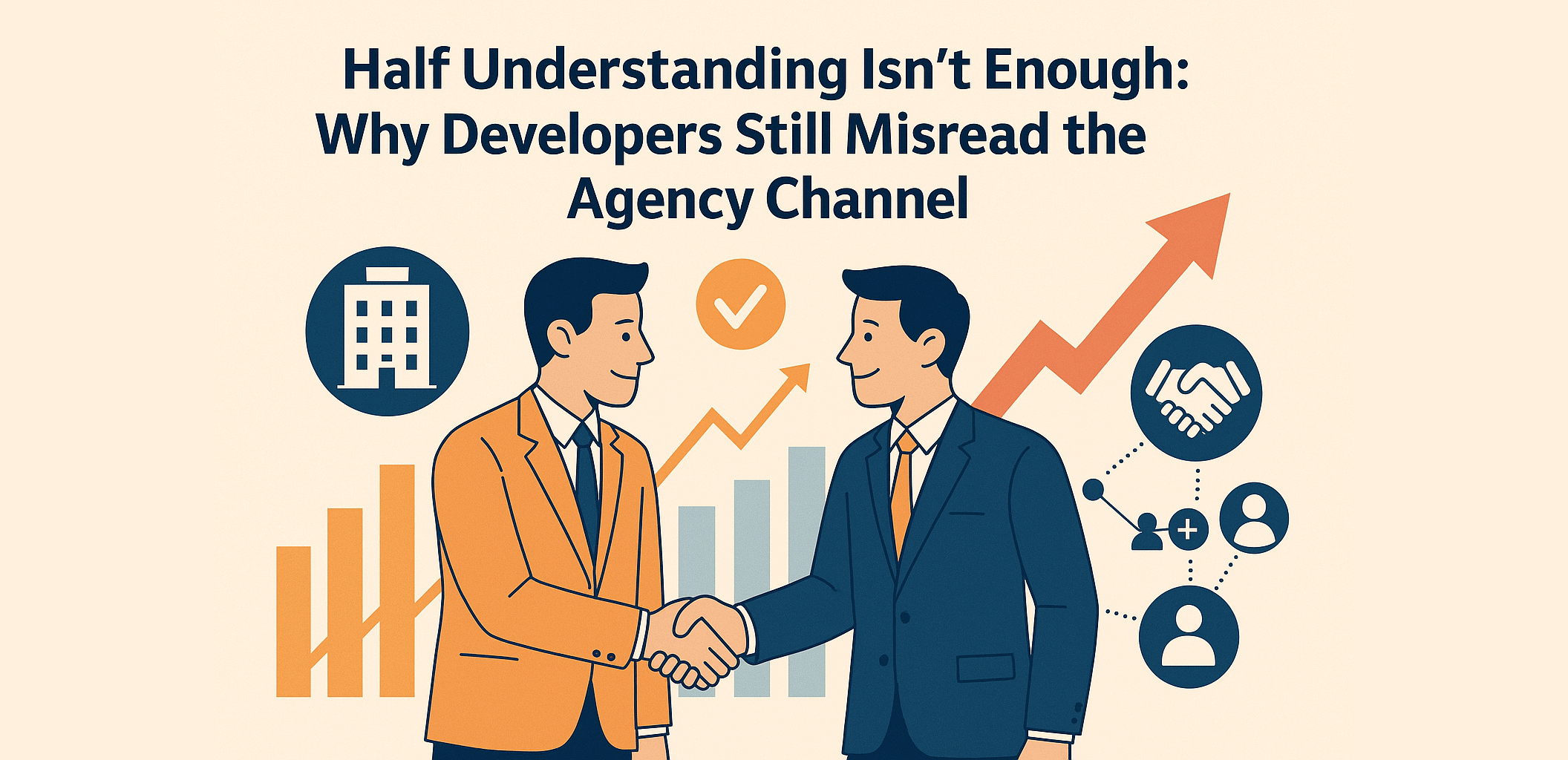Half Understanding Isn't Enough: Why Developers Still Misread the Agency Channel

Most developers now accept one truth: property agencies are no longer optional—they are the backbone of modern sales execution.
They recognize the financial benefit: the success-basis model means no upfront payroll, and payments are made only after revenue is secured. From the developer's narrow financial view, this looks efficient—a low-risk, pay-when-paid sales engine.
But that is only half the story. It's the half that extracts value from agencies, not the half that creates compounding value with them.
1. The Short-Sighted Model: Exploit, Delay, and Burn
Many developers still treat agencies like disposable subcontractors: use them, drain them, and replace them.
Their outdated playbook is simple and destructive: Appoint, Push, Delay commission payments, and then Replace when morale collapses. This hit-and-run approach may look cheap in the short term, but it actively destroys brand credibility.
The irony? Every ringgit saved on delayed commissions costs them tenfold in lost trust.
Why the Burn-and-Churn Strategy Backfires: The agency ecosystem is an immediate intelligence network. A single unpaid invoice travels through dozens of WhatsApp groups overnight. Developers who are bad paymasters quickly become market pariahs, ensuring future launches face skeptical partners and reduced velocity.
2. The Long Game: From Vendor Management to Equity Partnership
The most successful developers move far beyond contracts; they engage in strategic investment. They don't just hire agencies; they grow them from the ground up to become a dedicated, high-performance sales machine.
What Full Understanding Looks Like: Equity Partnership. Instead of managing dozens of non-committed vendors, the fully evolved developer invests capital into a chosen agency firm. This allows them to:
Guarantee Loyalty: The agency is now financially and strategically bound to the developer's success, eliminating the risk of units being prioritized elsewhere.
Ensure Velocity: By funding the agency's growth—recruitment, training, and technology—the developer creates a sales engine specifically engineered to move their inventory faster than the competition.
Achieve Complete Alignment: The agency's long-term strategy and the developer's project pipeline become one, multiplying commitment and focus.
The developer is no longer a client; they are a co-owner of the sales channel, securing a perpetual, high-performing sales asset.
3. The Ecosystem Multiplier: Arming the Sales Force
These strategic developers take the concept of investment further by expanding the agency's capabilities into multi-sector powerhouses. They provide the agency with the "weapons" needed to control the entire property life cycle, ensuring buyer commitment remains high even in down cycles.
| Agency Expansion Area | Developer’s Strategic Investment | Strategic Payoff |
|---|---|---|
| Short-Term Rental | Approve flexible usage or furnish schemes | Attracts investors and boosts take-up rates by demonstrating immediate returns. |
| Property Management | Co-create management frameworks & leasing arms | Protects project image and assures future resale value, appealing to long-term buyers. |
| Renovation / Fit-Out | Bundle design or endorse fit-out partners | Adds immediate value and shortens the decision time for end-users. |
| Data & Valuation | Share detailed project data and site intelligence | Enables accurate pricing and faster closing with informed buyers. |
By helping their agencies become multi-service powerhouses, developers create sales machines capable of sustaining momentum across market cycles, making their projects inherently more attractive to investors and homeowners alike.
4. The Strategic Payoff: Partnership Over Procurement
A developer who truly understands the agency model treats it as a long-term investment, not a procurement line.
This isn’t philanthropy; it’s enlightened self-interest.
Every ringgit spent on agent motivation and agency growth returns multiple folds through faster absorption, better publicity, and stronger brand goodwill.
Because at the end of the day:
An agency you empower will aggressively sell for you. An agency you exploit will sell against you.
Final Verdict: Build Networks, Not Dependencies
Engaging agents is no longer a tactical choice—it’s a strategic philosophy.
Partial understanding sees agencies as temporary tools to save payroll cost. Full understanding sees agencies as equity partners that scale revenue, reach, and reputation.
Developers who invest in agency growth build distribution empires. Those who don’t will keep searching—because the last agency has already left, and told everyone why.











































































































